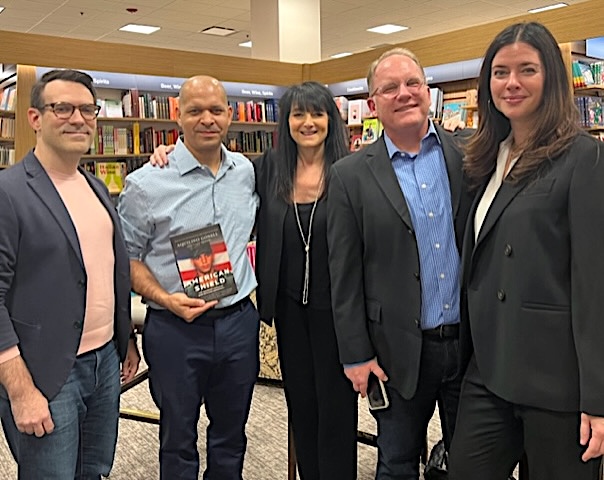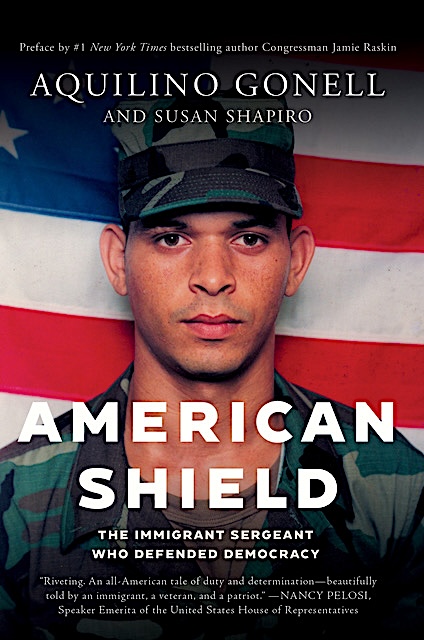BY RUTH BONAPACE | “I work best with people who are my opposite,” said Susan Shapiro at her Greenwich Village apartment, introducing Aquilino Gonell, her coauthor on “American Shield,” just out from Counterpoint Books. The book chronicles how Gonell, a Dominican immigrant Capitol Police officer sustained permanent injuries in the violent siege on Jan. 6, 2020.
How did you two meet?
AG: Olivia Troye, Mike Pence’s former national security advisor, who is half-Mexican and speaks Spanish, suggested I write a book to tell my story. She introduced me to literary agent Meg Thompson. Susan was a bestselling author who worked with one of her subagents and had coauthored other projects with a Bosnian-American my age who’d come to this country the same year. As a writing professor she’d helped other veterans and immigrants publish essays and books. I felt like I was in good hands.
SS: I was incredibly impressed with the sergeant’s heroism. But there were other January 6 books out there, including Congressman Raskin’s powerful bestseller, “Unthinkable.” So, I wasn’t sure if we’d have luck. I suggested we start with a few short pieces to see if there was interest. The first one sold to the Washington Post and the second one in The New York Times, titled “I Was Betrayed by President Trump,” went viral. Several book editors reached out and I loved Dan Smetanka at Counterpoint Books, who wound up publishing it.
What was the most difficult part of this project?
AG: I had to relive the post-traumatic stress syndrome I suffered as an Iraq War vet that was triggered by January 6. And it was hard to write it so quickly.
SS: He was working full time, doing physical therapy to heal his extensive injuries from the insurrection and busy giving testimony to the January 6 committee, the F.B.I. and D.A. English wasn’t his first language, he’d never written before, and they wanted it in three months. Oh, and he wanted a whole bunch of lawyers to go over everything we wrote, and they almost ruined it. The last thing you ever want is for a lawyer to censor what you’re writing.

What was your motivation to write this book?
AG: After I testified before Congress, I heard commentators on Fox News who didn’t interview me and didn’t know anything about me say inaccurate things about me. It made my blood boil. I needed to tell my own story.
SS: I was so impressed with all the obstacles he’d overcome, from growing up poor in the Dominican Republic to having a rough family life in Crown Heights, Brooklyn, to enlisting in the Army to pay for college and winding up fighting in Iraq, struggling to learn English well enough to become an American citizen and finish his B.A. at 26, the first in his family to graduate from high school and college. I really wanted to help him. I have a pretty nondramatic life at this point, living in the Village with my husband, writing and teaching for decades. So, it was exciting to collaborate with someone who had such a dramatic, important story to tell.
AG: I arrived in the US in 1992, and I came here without knowing the language. I strived to make myself better. I was getting out of debt, moved to a new house, helped pay my mom’s debts by 2018. I was promoted to sergeant, and everything was falling into place. Until January 6 happened. I sustained multiple injuries. I could barely close my right hand. My left shoulder was in excruciating pain. I had two surgeries and painful physical therapy. I tried to overcome those limitations, but I was no longer able to do my job. I passed the test for lieutenant, but my doctors recommended that I not continue police work.
How is this book different from others about that day?
AG: In my case, I’m an immigrant of color who was fighting off native-born, white American nationalists trying to desecrate the seat of our democracy. I did it not because someone else told me, but because it was my duty and my oath to my country.
SS: There’s a line that a mentor told me, “If you got the story, tell it. If you ain’t got it, write it.” He had the story. It was mostly a matter of asking him questions and writing down his answers. Though sometimes I’d have to cut long political tangents or stories that we didn’t need. As I tell my writing students, “Just because something really happened isn’t enough reason to write and publish it.” There’s a limited number of pages. I wanted to stay focused on what the sergeant could add to the conversation.

AG: I never thought my story would be extraordinary enough for a book, and the day I got my first copy, I cried. January 6 changed everything in my life. I did what I did because it was my job and I kept my oath, not for notoriety. Had January 6 never happened, no one would know who I was, except for my family and friends, and that would have been fine. I’d rather have my job, my health, my tranquility. I never wanted to be a troublemaker or a whistleblower, but I couldn’t keep quiet about this.
What do you hope your readers come away with?
SS: Well, we hope that people who read this will get more of a sense of how racist, elitist, corrupt and dangerous Donald Trump was, and why he can’t ever be elected to public office again. It’s a disgrace that he won a presidential election to begin with, because the country was too sexist to elect Hillary, who was smarter, classier and could have done so much better a job. I keep thinking of how many lives she would have saved during the pandemic alone. In the foreword, Congressman Raskin writes that Sergeant Gonell is Trump’s opposite, a humble, hard-working, self-sacrificing hero. Whenever he’d get rejected or hurt, he never gave up. He’d ask for help, try harder, take another chance until he nailed it. He’s very inspiring. Struggling to make it as a freelance writer in Downtown Manhattan, I could relate to his mantra: Never give up.
AG: Yes, I hope people realize that our democracy is fragile and that we need to choose wisely who we elect to make decisions on our behalf. I want them to see that, as an immigrant, I gave back and contributed to the nation that gave me a chance. Many immigrants like me are hard workers, fought to be educated, pay taxes, vote, contribute to the betterment of our society and make sacrifices for this country. And for young people to know I didn’t give up. I grew up in poverty, lived in the ’hoods with crime and drugs, but found ways to stay clean and slowly get ahead. Make a decision to do good in the world. Pursue things that will make you and your world better.
Aquilino Gonell and Susan Shapiro will be doing a free, in-person book event on Fri., Nov. 17, at 7 p.m. at the Salmagundi Club, at 47 Fifth Ave., and another online via The Strand bookstore on Mon., Nov. 20, at 7 pm. To register for the online panel discussion, click here.


Be First to Comment